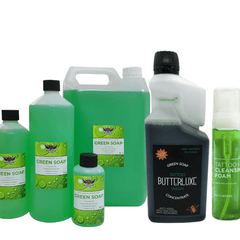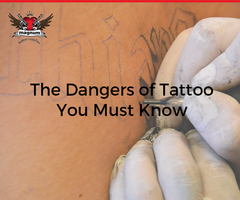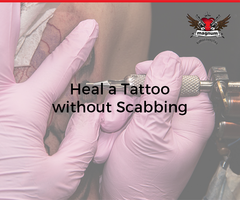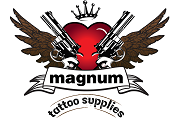Tattoo Green Soap 0

Tattoo experts and tattoo artists make use of the Tincture Green Soap – before, during, and after a tattoo procedure. This Green Soap is a therapeutic soap that is not available in local stores. It can only be purchased from medical and tattoo supply companies. The name “green soap” was formulated by tattoo artists. Tattoo artists use this by placing the soap into a spray container or bottle and then dilute it with water prior to a tattoo procedure. The spray container let the artist spread the solution to client's skin without even touching it. This is to ensure sanitation and to maintain hygiene throughout the procedure.
Tincture Green Soap disinfects and sanitises the skin of the client prior to tattooing. The tattoo artist then wipes the client's skin with disposable paper towel after spraying green soap onto the skin while wearing a fresh pair of nitrile gloves. The green soap moistens the client’s skin at the same time cleaning the area to prepare it for hair removal. While the green soap is still on the client’s skin, the tattoo artist removes the hair through shaving the body part in order to put a stop to ingrown hairs from the needle entering the skin and to have no difficulty during stencil transfer.
Subsequent to the shaving of the hair in the area where the client decided to put the tattoo, the tattoo artist will use another disposable paper towel to wipe the skin and use the green soap again to remove any loose hair. Then, the tattoo artist will spray the skin once again to moisten the clean and shaven skin. When the stencil for the tattoo design is applied, you will be asked by the artist to stand still.
What is a stencil by the way? A tattoo stencil is a sketch of your tattoo design on transfer paper, which the tattoo artist makes use of as a reference while doing your tattoo. The artist will strip the stencil paper off after a minute or two and will ask whether you approve the positioning and the size of your chosen design. If it comes to the point where the design is improperly placed or it needs to be removed due to a last minute design change, the tattoo artist will use the green soap and wipe it again with a paper towel to remove the stencil.
Green soap is free from dyes and has low alcohol content, the green soap also serves as a cleaning agent during a tattoo procedure. For the duration of your tattoo procedure, the tattoo artist will wipe the excess ink off the tattoo while performing the outline and shading. With this, the tattoo artist will be able to have a quick look to the next line in design and examine the previous lines or shading just in case additional ink is required. Once the tattoo is finished, the artist will clean excess ink, and blood using the green soap.
Safety Tips for Tattoo Artists 0
 Tattoo is a form of art that should only be done by professionals, it involves a lot of risks that can even put a customer’s life in danger. That’s why tattoo artists should always practice safe tattooing. When I say safe, I'm not only referring to safety measures to be done in the workplace or on your clients. Safety should also be considered for yourself, as a tattoo artist. It means taking steps to keep yourself out of trouble, out of jail and out of the hospital.
Tattoo is a form of art that should only be done by professionals, it involves a lot of risks that can even put a customer’s life in danger. That’s why tattoo artists should always practice safe tattooing. When I say safe, I'm not only referring to safety measures to be done in the workplace or on your clients. Safety should also be considered for yourself, as a tattoo artist. It means taking steps to keep yourself out of trouble, out of jail and out of the hospital. Here are some precautions you can follow:
- Get a license to tattoo
- Always display your business license in your shop
- Turn down clients who are intoxicated, there can be excessive bleeding if you tattoo someone who's been drinking.
- Make sure your clients are of legal age
- Have your clients sign a waiver before inking them.
- Minimise hazards to your own health with actions like disposing needles properly
Having a safe working environment means keeping your shop clean, and keeping your equipment sterilised . Every tattoo should be treated delicately and properly. This means your storage should always be stocked up on supplies that keep your workplace clean, your materials sterilised, and most especially, your clients safe from any disease or infection.
A Tattoo Artist should never run out of:
Gloves
Gloves should always be worn while cleaning and prepping a tattoo. After using it, throw the pair away, and wash your hands with antibacterial soap. A fresh pair should always be used whenever you start doing a tattoo.
Cleaners & Disinfectants
Reusable metal grips, other materials should always be cleaned using a disinfectant solution. The tattoo chair, autoclave, basically the entire area should be thoroughly cleaned.
Autoclave
Purchase a good autoclave that can be used to properly sterilise your tools in between clients. You'll also need sterilisation pouches to use with your autoclave.
Sharps Container
Prevent accidents and dispose needles properly in a Sharps Container. There are a lot of Sharps recovery solutions available, so you can choose the right size of container for when you're traveling vs. working in your shop.
Topical Skin Cleansers
Always have a skin cleaner that you can use for your client’s skin. Green Soap is one of the most popular pre-tattooing cleansers, but it isn't your only option. You should avoid using rubbing alcohol, because while it can assist ink in entering the skin more easily, it can also cause ink to be carried further into a person's system than desired.
Antiseptics & Ointments
Check your first- aid kit. Make sure you have a supply of antiseptics, ointments, and other first aid supplies to use when needed.
Disposables
It is easy to maintain a sterile work area with disposable items. Once the tool is used up, just throw it away. A lot of the supplies you'll need for tattooing are available in convenient disposable form. Stuff like clip cord covers, tattoo sleeves, cases of Precision Medical Cohesive Wrap that you can use to pad grips, gauze, skin markers for drawing tattoo patterns directly on your clients' skin, face masks, exam table paper to line tattoo chairs, and a bunch of others are examples of disposable items that should be found in your shop.
Disposable Tattoo Tubes
Instead of buying a reusable, autoclavable tattoo grips, steel tubes and tips, invest in disposable tattoo tubes. It has all those components in one convenient unit that you can use and then throw away. There are styles to fit every tattoo artist's preferences.
Tattoo Needles & Tattoo Needle Bars
Needles should not be reused. Even if you sterilise it and apply your whole supply of cleaner or how many times you autoclave them, it’s just not safe and smart to reuse needles. There are a lot sterile needles in store. From flat, magnum, round, and stacked needle configurations, bug pin needles, short standard tapers, long tapers, name it.
Some of the most important things you need for safe tattooing are listed above, check your trusted tattoo supplies shop for the items mentioned above.
Things You Need To Know Before Buying Your First Tattoo Machine 0
 What makes a great tattoo aside from the design, colour and size? No matter how great the design looks, if it's done by someone who doesn't have proper knowledge, experience and the right equipment then the tattoo just won't look great. As a tattoo artist, you have to invest in your Tattoo Machine. If you're an apprentice planning on buying your first tattoo machine, here are some guidelines that may help you decide and choose the perfect tattoo machine for you!
What makes a great tattoo aside from the design, colour and size? No matter how great the design looks, if it's done by someone who doesn't have proper knowledge, experience and the right equipment then the tattoo just won't look great. As a tattoo artist, you have to invest in your Tattoo Machine. If you're an apprentice planning on buying your first tattoo machine, here are some guidelines that may help you decide and choose the perfect tattoo machine for you!
Things You Need to Know about Tattoo Green Soap - Buy Tattoo Green Soap Online 0
 Tattoo Green Soap is one of the most important things a tattoo artist uses, but what is it for? And why is it important? Read through to find out important details about Tattoo Green Soap!
Tattoo Green Soap is one of the most important things a tattoo artist uses, but what is it for? And why is it important? Read through to find out important details about Tattoo Green Soap!The Dangers of Tattoo You must Know 0

Some people get tattoos to honour their loved ones, their religion, culture or whatever it is that is important to a certain individual. People who have experienced getting a tattoo already know what to look for and what to check when choosing a tattoo artist or selecting a tattoo parlour to do their next tattoo. They ask questions like “Does the artist wear gloves?” and “Do they sterilise equipment before and after using it?” If it's your first time to get a tattoo these are the things you should be looking out for. If you have questions you want to ask, don't be afraid and ask them as long as it will not offend them, and you ask it in a nice way.
However, one question everyone forgets to ask about is “What does the ink contain?” For first times, all the inks might look the same. Some tattoo inks are made of ingredients that can cause allergic reactions. Tattoo Ink manufacturers sometimes don't include these details when they market their products. That's why it's important to research prior to getting a tattoo.
Water is one of the key ingredients in tattoo inks. It is the one responsible for creating the ink product and diluting the ink in parlors. Water is used in diluting the tattoo inks to obtain the specific shade of color a client wants. But, put in mind that any kind of unfiltered water can contaminate the ink and can allow harmful microorganisms to contaminate it, resulting to infectious diseases that may even kill you.
It might not be as popular as it really should, but contamination of tattoo ink products by unfiltered water has become a great problem. These infections will continue to occur until tattoo ink manufacturers and tattoo artists will fully understand the danger it brings to the client’s body. Lucky for those who only need medication for a few weeks or months to get better, but how about those who need to have multiple surgeries and have to go through under the knife just to treat their illness? It will live a scar not only to their skin but also to their lives.
How can clients protect themselves? What are the precautions that a tattoo artist must do to avoid these problems? Here are some of the precautions every tattoo artist must follow. A tattoo artist:
- Must not use products that are not meant for tattooing;
- Must use sterile water if dilution is needed;
- Must not use unsterilised water in washing and rinsing the tattoo equipment.
- Must make use of disease-free techniques in tattooing like maintaining a good hygiene and using clean gloves
In order for customers to avoid the risk of being infected by a disease, they must choose tattoo parlours and tattoo artists that are registered and approved to operate. That way, the customer can be confident that the tattoo artist follows rules and regulations to safe and sanitary tattooing.
Heal a Tattoo without Scabbing 0

Fresh tattoos look so amazing. I remember having my third tattoo, I just kept staring at it, amazed by how great my tattoo artist was. But one stage that irritates some people after having a tattoo is the scabbing. It's itchy, even uncomfortable for some.
Scabbing is a natural part of the tattoo healing process, it's technically a wound so scabbing is pretty normal. What’s hard is fighting the urge to scratch and peel it. You may control it during the day, but you might find it hard to avoid when you're sleeping. Another thing that can happen is when your clothing gets caught on the rough edges of the scabs and tears it off. If this happens you might even need to have a tattoo touch-up.
So the question is, what should you do during your tattoo's healing process?
There are a lot of aftercare tips and techniques that may help you speed up and "survive" your tattoo's healing process. Some say bandages keep the tattoo safe, others say the skin should be able to breathe to help it heal faster. Some say using tattoo soap helps, others say it doesn't make a difference. It can get very confusing because you only want what’s best for your skin, right?
When some people feel uncomfortable after they get their tattoos done, they automatically assume it's infected and start taking unnecessary measures. Before you take any action, read through this article so we can give you some advice.
It may differ depending on what your tattoo artist tells you, but here are some ground rules.
• Before touching your tattoo, always wash your hands with soap and clean water.
• Avoid scratching your tattoo.
• Always wear clean and loose clothing
• Stay away from the sun or tanning beds.
Make sure that once your tattoo is finished, ask your tattoo artist to bandage your tattoo. Bandages are a must to avoid infections on your way home from the tattoo parlour. Before going to bed, wash your tattoo with a bit of cool water, try not to rub it yet. You can ask your tattoo artist for some tattoo aftercare products like antibacterial lotion, and mild soap. If your tattoo is located somewhere you can easily reach and scratch, cover it with plastic wrap. Take off the plastic wrap in the morning and rinse your tattoo with cold water. Use a paper towel to gently pat it dry, or you can always let it air dry. Once it's dry, use the antibacterial lotion you got from your tattoo artist. Apply the cream every time your tattoo feels dry and itchy.
After about a week, wash your tattoo twice a day. Rub it with a tiny amount of lotion after your tattoo dries. Be careful not to overdo it.
Continue doing this for the next 2-3 weeks until the initial healing period of your tattoo is over and done with!
Isn’t it fulfilling to see your piece of art heal perfectly? You never need to worry about having to do a touch up!
Follow these simple and easy tips for your road to a happy healing.






